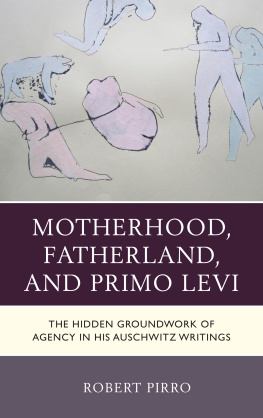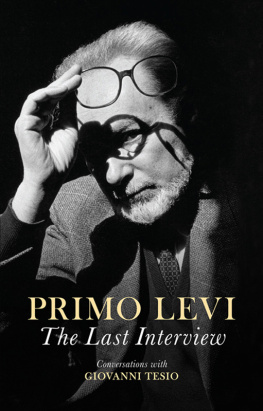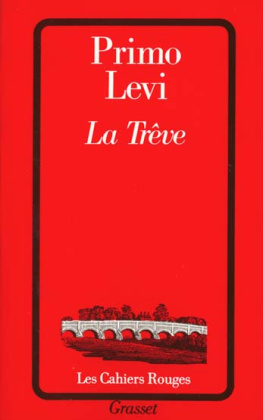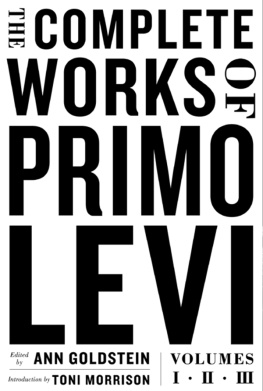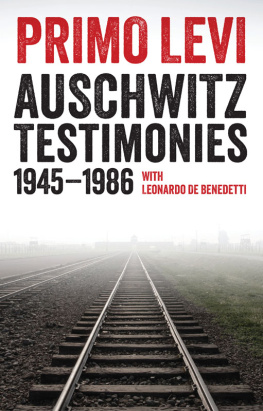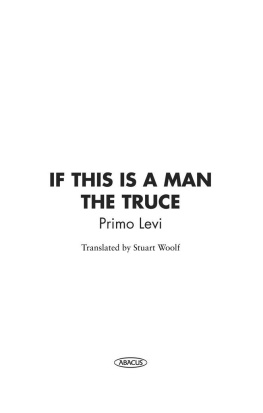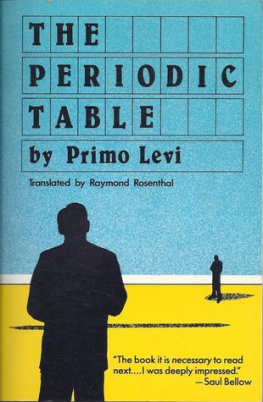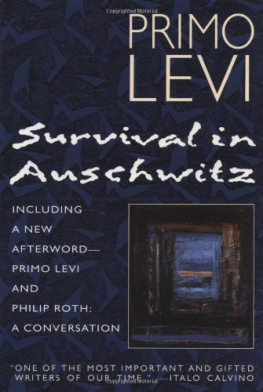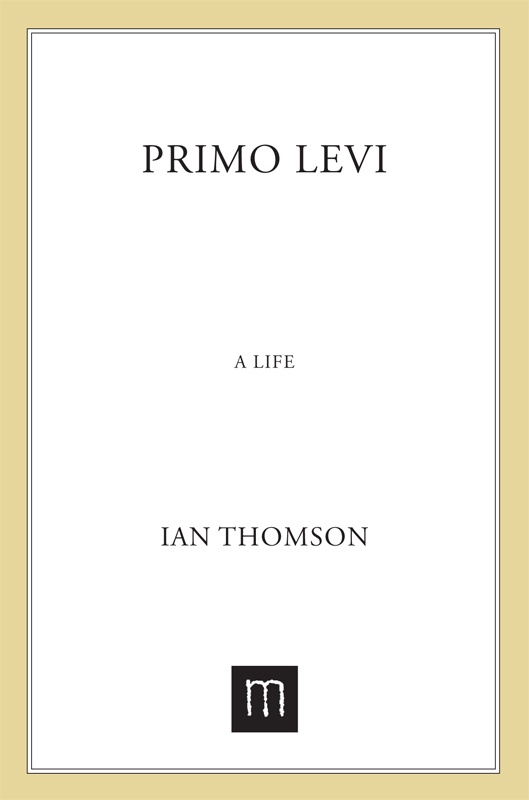
The author and publisher have provided this e-book to you for your personal use only. You may not make this e-book publicly available in any way. Copyright infringement is against the law. If you believe the copy of this e-book you are reading infringes on the authors copyright, please notify the publisher at: us.macmillanusa.com/piracy.
Contents
For
Laura in London,
and
Laura in Rome
and
to the memory of
my late father,
John Thomson (19282002)
Over the hospital grey clouds move slowly northward,
And, inside, the nurses chart the human worlds defeat.
Alan Ross, German Military Hospital, The Derelict Day: Poems in Germany, 19451946
Preface
When I arrived in Turin in early 1991 to start work on this biography, I had few contacts and was unsure how to begin. It is fantastically difficult to fashion a narrative out of the inchoate facts of someones life. I knew, however, that Primo Levi had been an enthusiastic mountaineer. So my first move in Turin was to visit the National Museum of the Mountains. Unsurprisingly, there was little information of use there beyond some Fascist-era alpenstocks, plus-fours, and a stuffed ibex. Levis widow, Lucia, had made it plain to me that she was unavailable for interview. I met her son, Renzo, for aperitifs in Turin. Like his mother and sister, Renzo was not prepared to be questioned about Levi. However, he wanted to confirm that while the family would not help, neither would they hinder my research.
From the start, I was determined to construct a life of Primo Levi not found in his books. It seemed to me dishonest, as well as dangerous, to recast Levis printed words in a biography. Levi contrived some elaborate autobiographical fictions, and that is partly why he is such a difficult subject for a biographer. So I set out to interview as many people as possible; under no circumstances would I take Levis own words as gospel.
Turin is a small city, and soon word got round. I was considered diligent (some reportedly said obsessive) and Levis friends began to speak to me. Until then, my knowledge of Levi was confined largely to the interview I had conducted with him shortly before he died. Few biographers get to meet their subjects. The interview had provided me with an enduring image of Levi, and much of my research was informed by it.
Primo Levi was in shirtsleeves for our appointment, and the tattoo 174517 was visible on his left forearm. (A typical German talent for classification, he tartly observed.) It was a summers afternoon in July 1986. Levi was then almost sixty-eight, but he still had a sprightliness about him. I had seen him earlier that year at the Italian Cultural Institute in London, where he gave a talk. Afterwards I contacted him for an interview, which I hoped to publish somewhere. I had already printed in the London Magazine several interviews with Italian writers, among them Italo Calvino, Natalia Ginzburg, Leonardo Sciascia and Alberto Moravia. Levi was to be part of a set. Throughout our conversation he sat in a worn chintz armchair, smoking the occasional Alaska menthol cigarette. His beard was neatly clipped and he wore metal-rimmed glasses. The study, sparsely furnished, contained an anglepoise lamp, a word-processor and some other basic necessities for writing. Books lined the walls, a few in English. There were framed certificates from Levis former profession as a chemist and, suspended above a glass-fronted bookcase, an owl, a penguin and a giant butterfly modelled by Levi out of industrial copper wire. For thirty years he had been the manager of a paint and varnish factory outside Turin. The only other ornament in the room that I could see was a sketch of a half-destroyed wire fence: Auschwitz.
In Italy, Levi is a national monument. I was twenty-four and nervous of meeting him. The Turinese, moreover, are considered by other Italians to be two-faced and frosty ( falso e cortese, they say: false and courteous). Yet the Levi I met was warm and engaging, a mixture of seriousness and sweetness. The afternoon was full of unexpected laughter, and there were moments when Levi became animated, for instance when the talk came round to mountaineering. I had decided to leave the question of Auschwitz until later, unsure how to approach it. Absurdly, I was fearful that it might distress Levi. I asked him instead about his science fiction and chemistry. Listening to the tapes of the conversation today, I am struck by how stock Levis answers seem. Levi was a practised interviewee by the time I met him; he could professionally field questions on the Nazi scourge. The second half of the conversation centred on If This Is a Man, which is now a set text in Italian schools. No other work conveys the unique horror of the Nazi genocide more directly and profoundly, or interrogates our recent moral history so incisively. For its quiet testimony of mans inhumanity to man, it remains one of the essential books of our age.
On my way out, I noticed a horseshoe nailed to the wall by the front door. An uncle had found it in the street, but I dont know if its brought me any luck, Levi commented wryly. I was thrilled when he added that the interview had given him much pleasure. Nine months later, Levi was dead.
* * *
This book has been under way for some time. In the course of the five years of my research in Italy, Germany, Poland, America and the United Kingdom, I interviewed more than 300 people, and corresponded with half that number again. I had six long interviews with Levis sister, Anna Maria. She is an attractive, unconventional woman with a sharp sense of humour. When she learned that I had met her brother, she seemed both moved and delighted. During our final conversation she announced, quite unexpectedly, that Aldous Huxleys second wife had not only been to the same school as Levi, but had lived in the same block of flats where he was born. I pursued the connection and found Mrs Laura Archera Huxley living in a Hollywood villa. She was able to tell me about the pre-war Turin that Levi had known as a boy.
In the hope of tracking down others who knew Levi, I placed advertisements in Scientific American and Chemistry and Industry. The response was good. A Jungian analyst in London contacted me, as did a biophysicist in Atlanta, and a Polish-born survivor in New Mexico. They had all known Levi, and all had interesting things to say about him. The biographer is also a sleuth, piecing together information, and attempting to trace witnesses. An Italian ex-deportee, Elena Simion, had been repatriated to Venice in late 1945 from the Soviet transfer camp of Katowice in Poland. She had briefly known Levi in Katowice. For the statutory fee of 30,000 lire, a clerk in the Venice births-and-deaths register was able to inform me that, while Simion herself was dead, her daughter Nadia was still living in the Veneto area. Nadia Hamilton had been born in Poland on 25 May 1945. Her father, Robert Hamilton, was a Scottish POW, who had also been repatriated from Katowice. I very much wanted to track him down, not just for his memories of post-war Poland (which I hoped might complement those of Levi in The Truce ), but for his daughters sake. Nadia had never met her father. I got as far as Woking, Surrey, before reaching a dead end.
Other quarry proved less elusive. The late Fulvio Tomizza was a gifted writer from Istria, the border region between Italy and the former Yugoslavia. My letters to his publisher had gone unanswered and he was not on the phone. So I went to Croatia on the off-chance of finding him. Arriving by taxi at the village of Materada, I asked where Tomizza lived and was given directions. He was raking leaves into a bonfire when I found him. Youve come from London? Over a bottle of local wine, Tomizza spoke to me of Levi and the difficulties I would surely encounter in writing about him. Primos is not an easy life to enter, he warned. Levi was noted for his determination to protect his privacy and for keeping secret what he wished to keep secret. He often surrounded himself with people who were not well known: they were factory-hands, wine producers, metalworkers. Most of them would enthusiastically respond to my requests for information. But in a few cases their memories of Levi proved to be uncertain, tainted by third-party reminiscences or just dimmed with the years. Unreliable sources were one of many pitfalls that awaited me as Levis biographer.


